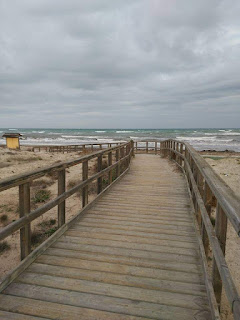The lowered gaze wrapped in a drop of dew. Dreams below, we discover it’s not tears on the face but the morning mist that clouds their eyes. Around them, concertina wire fences with Y-shaped posts enclose the field, making the nearby green hills inaccessible. The galvanized steel gleams with its sharp blades. No trace of blood remains. The rain washes it away, mixing it with the earth. Europe’s history is one of its borders—natural and artificial. Mountains and, in the vast Central European plains, rivers. It is also the continent of just wars and blood-soaked peaces, of massive ethnic, linguistic, religious, ideological, and cultural deportations. No other continent can teach us anything new about the ways of suffering or inflicting suffering. In that, we are masters and have opened schools in every corner of the Earth. We have also theorized like no one else about our truths and the perfidious intentions of others. We are the cradle of the philosophy that justifies terror as a civilizing and redemptive mission. Until the 16th century, in the valleys and mountains of old Europe; since then, also in the continents conquered and civilized with the sword and, not always, with the cross.
There have always been reservations, missions, reductions, apartheid, provisional and final solutions here and there. Paths, trenches, minefields, rivers, quagmires, swamps, estuaries, canals, forests, hills, mountains, wheat fields that burn, choke, and kill in August. And above all, people willing to kill: for God, for the homeland, or for the home. And people willing to innovate the art of war: from the reconcentration of populations in the Cuban War, which J.L. Tone calls concentration camps (War and Genocide in Cuba: 1895-1898), to the same tactics, with different landscapes, used by the British in the Boer War, to the spirit of economy, precision, calculation, and pedantic meticulousness that Grossman attributes to many Germans and that Hitlerism applied to exterminate Jews in Treblinka, “exactly as if it were the cultivation of cauliflowers or potatoes,” or the Soviet gulag, about which Solzhenitsyn speaks in his brief and memorable One Day in the Life of Ivan Denisovich. The truth is that Europe has little to teach about the art of happiness, no matter how many great thinkers have sublimated its pursuit, tying it to a way of organizing the economy and society, a religion, or the color of hair, eyes, or skin.
We Europeans are proud of our material progress and our freedom, believing these attributes shield us from the harshness of a suffering but distant world. That’s why it causes us only transient, bearable discomfort when a suicide bomber massacres 72 people in an amusement park in Lahore, and sincere indignation—sometimes accompanied by gestures and calls to preserve the Christian roots of our past—when terrorism strikes cities like Madrid, London, Paris, or Brussels. We silence our leftist intellectuals, usually cultural relativists, when they probe the deep causes of terror and the daily death that reigns in countries like Afghanistan, Iraq, or Syria. In reality, we insist, those people have nothing to do with us, and the multitudes fleeing war bear no resemblance to the romantic exiles of the 19th century. Even those who have lived within our borders for generations are not ours. They are marginalized, yes, but not in our way of being.
For weeks, it has rained in Idomeni. Refugees have slept in the mud, waiting for the border to open any day. The refugee camp on Lesbos has been locked down tight. Battered Greece, pariah Greece, despised by much of the European Union, which once rejected the Troika’s dictatorship in a referendum, becoming a beacon of hope for another possible Europe, has now become the jailer of refugees fleeing war. And it has likely done so in the name of redemption. It matters little that international law has been shattered, that Europe has chosen to treat others like cattle again, to transport them like cattle, to think of them as cattle. As in the first half of the 20th century, Europe burns its values on the pyre of nationalism and border closures. Mountains, rivers, canals, seas, and inland lakes once again become exclusive spaces of death and the absence of law.
The lowered gaze wrapped in a drop of dew. Dreams below, we understand that for seventy years we have been rebuilding invisible borders on our continent, and borders of galvanized steel with blades that tear flesh to contain the pariahs wandering the earth. That was not the dream of the united Europe of the postwar era.
Seventy years lost, only to relapse into crime.



.jpg)

¡Fantástico! Como siempre, desmenuzas el libro con rigor, sabiduría y respeto. Llegas hasta lo más profundo y lo sacas a la LUZ. Nunca podremos agradecer de manera suficiente tu inestimable colaboración. Un gran abrazo, amigo.
Gracias por vuestro aprecio. Un abrazo grande.